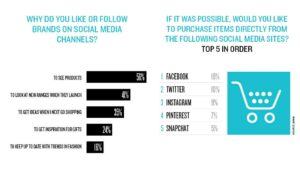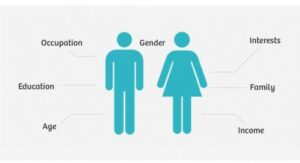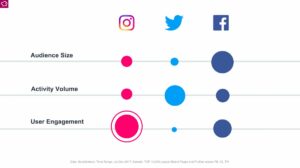Marketing your ecommerce business on social media has become one of the most essential things to do, regardless of the scale or scope of the business. Some do it to attract a new or build a larger customer base, others use it solely to give their business a kick start; this is so because social media marketing is relatively cheaper than conventional marketing and the results are, for the lack of a better word, more tangible and rather quick. Not just that, it is also more engaging for the users.
The stats below show the relationship of consumers with the brands they like through social media platforms:

As the stats illustrate, 56% of the people surveyed say that they follow brands on social media channels to see products, while 19% said they would be happy to purchase products directly from Facebook, the most popular social media site. Let us now get on to how you can choose which social media platform is best for you to market your eCommerce business on:
Define Your Objective:
Before we jump to which platform to choose and how to go about using it, we need you to be crystal clear about what you want. Are you trying to:
- Improve your customer service and build customer loyalty?
- Create a channel for customer feedback?
- Update your customers on new products, services, or deals?
- Increase traffic to your website?
- Conduct informal market research?
Once you know exactly what you are aiming for at every stage of your business (because objectives change with each stage), you will be able to align the right kind of platform with your aims.
Make Sure You Know Your Audience:
While all of these platforms share similar features, something or the other about the set of benefits they offer makes them attract and engage a different kind of audience and user base; and that is one of the first things you must keep in mind, which will require you to first define the kind of audience you want for your business on the basis of certain details (aka demographics):

The better you know your customer and your audience, who will become your potential customers, the better you will know which platform they spend most of their time on, and that will help you decide which platform will be most suitable for your business.
Different platforms collect and store different kinds of data of their users; Facebook, for example, collects huge amounts of data of its users, from their location to their location to their interests and their likes and dislikes and what not, hence letting you target a very detailed set of demographics in a quick and easy way through its ad manager, also its ad manager is very user friendly.

When trying to choose between Facebook or Twitter, for example, consider the following demographics:
Twitter Demographics:
- Age based, the largest user demographic is those aged 25–34
- Facebook users are 53% female and 47% male
- 56% of online seniors aged 65+ are on Facebook and 63% are between age 50–60
Facebook Demographics:
- 32% of internet users aged 18 to 29 continue to use Twitter
- 13% of those aged 50 to 64 use Twitter
- Almost half of girls aged 15 to 17 (49%) use Twitter, compared to 34% of boys
- While only 19% of online moms use Twitter, 27% of online dads embrace the service
Facebook had 2 billion monthly active users at of the end of 2017, while Twitter has 330 million monthly active users. What you, as an ecommerce brand need to figure out is which platform has more of your target audience. Also, it is not imperative for you to choose between the two platforms; you can also opt to use both of them or more, if you can manage that.
Let’s take the example of an online jewelry store based in New York called Jewelry.com: They have 57 k plus likes on Facebook and almost 19 k followers on Twitter, while their resident blogger’s account has more than 32 k followers on Twitter.
Why would they need Twitter accounts when they have so many more likes on Facebook as compared to their Twitter following, you might wonder. Upon analyzing their profiles on both platforms, we see that they get relatively more engagement on Twitter than they do on Facebook. This also tells us that the number of likes/followers does not determine how much engagement you will get from a platform.
Learn From Your Competitors:
One of the best ways to get ahead in a game is to observe your competitor and see what works for them. Make a list of your competitors, and note which platforms they have been getting the most engagement out of their audience on. Do not only look at the successful competitors, though; notice the strategies of the unsuccessful brands that are similar to yours, too, and learn from them what not to do. It may also be possible that the fault lies not in their strategy, but in their execution; perhaps you can pick up their strategy and execute it to success.
If you were to open a fashion eCommerce store in Florida, for example, you would look up attractive, well-performing online fashion stores and the top 5 brands to appear would act as your main competitors. One of the top 5 online fashion stores that pop up in this list is Sophie and Trey:
As you scroll down on their homepage, you will see their Shop the Gram section. This tells you they put a special focus on instagram and use it as one of the major platforms to market themselves. It also acts as way of generating authenticity: Posting pictures of the client across your social media pages is a great way to establish trust among your followers and fans.
They are seen to quite regularly practice this on their instagram and they get good response too. Posting client pictures is a way to show your fans and followers that your customers trust you and it gives them an alternate perspective to your products. In this case, the customers also act as alternative models for the clothing products that this online boutique are selling.
All Those Numbers Don’t Always Mean Sold:
Just like all that glitter is not gold, all those numbers do not (always) mean your brand is performing well in terms of business.
When you look at your competitors for ideas, try not to care too much about the number of followers or likes they have. Instead of defining your goals in terms of numbers, keep in mind the platforms that will work for you in terms of attracting relevant audience and increased engagement.
Conclusion:
In this day and age, a new social media platform seems to emerge from underneath every rock you pick, but networks like Twitter, Facebook, Instagram, Pinterest, LinkedIn and Reddit still remain on top of a Social Media Marketer’s head, owing to the platforms’ huge user base and popularity. This makes it difficult for business owners to decide which social media platform or platforms to opt for or experiment with to market their business the right way and the appropriate amount. As an ecommerce business owner, you must understand how, why and with what frequency people use social media, and how those dynamics should impact your ecommerce strategy.
Remember, always prefer quality over quantity, for a larger audience will not always mean more conversions for your business. Initially, rather than defining your goals in terms of the number of fans or followers you want to reach, think about which platforms will best help you increase engagement with your audience.



